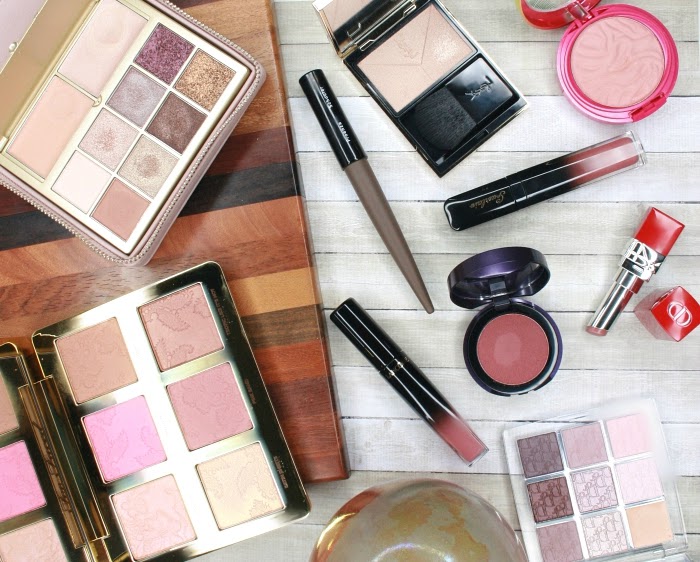Affiliate Links
Why in the world would anyone pay good money for a small bottle of fancy water to spray on their face? Why don't they just splash tap water on their skin and call it a day?
If you've ever been puzzled by the popularity of facial water mists coming from France, Avène, La Roche-Posay, Evian and the likes, today's French beauty post is for you! Let's take a moment to find out where the trend comes from, what makes these sprays different from regular water or other hydrating mists, and how you can use them.
The origins
It may seem like a recent craze, but the use of "special" water is actually deeply rooted in history. People have used water from specific springs in the hope of enjoying particular benefits since antiquity. The habit is probably as old as humanity itself, but ritual baths can be traced back to ancient Greece, where sanctuaries dedicated to divinities where often built near hot springs. Later, the bath house was central to the way of life in Roman culture and the Roman control of a huge territory in Europe and around the Mediterranean Sea popularized this ancient form of spa from the Britain to the Middle East and North Africa.
From there, the medical use of thermal water (water from hot springs) developed and became common to treat varied conditions, from sterility to leprosis. With the evolution of medical science, the chemical composition of thermal water from the different springs was studied and their properties better understood, allowing specific springs to be recommended for particular ailments.
Fast forward to modern times, when spa towns offering hydrotherapy treatments in France have become popular tourist destinations. You probably don't know this, but the French national health insurance system pays for 3-week stays at thermal treatment centers for some conditions when prescribed by a doctor! Avene, which is the name of a town in the Southwest of France, specializes in the treatment of skin diseases such as eczema and psoriasis.
At the end of the 20th century, the idea of creating a skincare line so customers could get the benefits of the water at home emerged, and in 1990, the cosmetics brand Avene was born, with the Eau Thermale face mist as their star product. In our post-modern times, the idea of a pure, natural, gentle product coming from the ground and increasing wellness resonated and many more brands were created from other thermal springs.
See, I told you, long history!
What makes thermal water different?
Since thermal water has medical uses, it is strictly regulated in France: it cannot be treated or altered in any way, and it is analyzed very regularly to ensure its purity, the absence of pollutants and bacteria. So if you were to compare it with tap water in most cities of the world, you would find that thermal water is a lot "cleaner" (no bacterial contamination and pollution). Being untreated, it's also completely natural and pure, free from chlorine or other chemicals used to treat tap water that often make it drying to the skin.
Its purity is due to a completely natural filtration system, which is also how it becomes rich in minerals: going through rocks! When it rains, water penetrates the soil and goes through layers of sediments and rocks, then gathers in natural cavities underground, before being pumped or coming out of the ground again in the form of a spring. The process can take decades: Avene estimates that it takes 50 years for a drop of rain falling on the nearby mountains to come out at the spring. During this very long time underground, the water slowly dissolves some of the minerals present in the rocks and carries them away, becoming enriched with a multitude of elements. Of course various types of rocks contain different minerals, which explains why the composition of thermal waters coming from different places varies so much.
Lately a lot of skincare brands from all over the world have been launching facial mists, promoting their moisturizing properties. The problem is that they often contain irritating ingredients such as fragrance, alcohol, or essential oils, that will all end up drying out your face even more. Unless you're really knowledgeable about skincare ingredients, it's hard to determine if a mist is actually good for the skin or potentially harmful. The good thing about water sprays is that you know exactly what they contain, and they're always suitable for the most sensitive skin.
Different waters for different needs
Since thermal waters have very different mineral and trace element contents, some facial sprays are best for specific skin types or needs. Here's a short list of the most well-known ones, but bear in mind that all of them are good for all skin types, including sensitive, in search of a refreshing burst of hydration!
- Avène: the most popular thermal water actually has a lower mineral content than most others, but a balanced amount of magnesium and calcium, trace elements, and contains a lot of silica. It has a soothing effect which makes it great for sensitive and irritated skins suffering from eczema, dermatitis, rosacea, or after an agressive dermatological treatment (like peeling or laser).
- La Roche-Posay: also rich in silica, but what makes it different is its high selenium content. Selenium is a trace mineral known for its antioxidants properties, which makes this water spray a good addition to any anti-aging skincare routine.
- Vichy: already known in Roman times for its thermal water under the name Aquis Calidis. Rich in 15 minerals, this water is good for basically everyone, rebalancing the skin's pH and strengthening it.
- Uriage: not available in the US, but definitely something to bring back from France if you ever visit. With its source in the Alps, this thermal water's high concentration in minerals makes it composition almost identical to the water found inside our skin cells (it is said to be isotonic). Because of that, you can let it evaporate on your face to get a moisture boost.
- Evian: it's usually described as mineral water rather than thermal water (I think because its best known use is as drinking spring water), but Evian is also a spa town on the French shore of Lake Geneva. With its neutral pH and low mineral content, the Evian water spray works for anyone.
Besides thermal waters, other brands offer different types of water that can also be beneficial to the skin:
- Esthederm Eau Cellulaire: the water in this spray is formulated to be close to water in your skin cells, so it can penetrate and bring them the nutrients and energy they need to function at their best. Esthederm is my favorite French skincare brand (sadly not available in the US), and this is one of my top products!
- Caudale Grape Water: I just reviewed this one very recently! Instead of spring water, this spray contains pure water extracted from grapes, and is rich in antioxidants substances present in the fruits such as polyphenols.
- Bioderma Hydrabio Brume: not to be mistaken for the SPF mist by the same brand, this one is simply called Soothing Refreshing Water (not available in the US as far as I can tell). Basically, it's plain water with minerals added to it to make its composition similar to thermal water. While it's not pure and natural, it's dramatically cheaper than a true thermal water spray (I paid less than 3 euros for the big bottle you see in the top pic!).
How to use a facial water spray
There are many occasions when enjoying a spritz of calming water is beneficial! Here are 10 ways that I personnally use it:
- First thing in the morning to wake up and refresh my face
- Just after cleansing, as a second step in my skincare routine. It eliminates any residue from the cleanser and moistens skin so any treatment applied later is better absorbed.
- To rinse my micellar water. Yes, micellar water doesn't need to be rinsed, but it doesn't mean that you can't rinse it if you want to. It's actually a good idea if you have sensitive or dry skin, or if your micellar water leaves your face a little sticky.
- To replace a toner. Mineral water sprays make a good toner since they're very gentle, oil-free and alcohol-free.
- On my clay, mud or charcoal masks. I've said it before, you shouldn't let your clay masks dry completely on your skin, because they will suck the water and life out of it! I spritz water regularly to keep my masks moist so they won't dry out my face, but still absorb oil and impurities.
- After shaving, waxing, threading. Basically, after any type of hair removal on my face or body that leaves my skin irritated, for fast relief. Avene is a good one for that!
- After laser treatments. I've done IPL sessions as well as laser hair removal, and spraying water regularly afterwards helps me a lot with the redness and burning sensation.
- Anytime my face is red or inflamed. Whether it's a minor sunburn, the heat, or a reaction to an aggressive skincare product, a thermal water spray soothes really well and quickly.
- During and after workouts. I have a tendency to get acne if I keep my face sweaty for too long, so the spray is a great way to refresh, clean up and calm my skin during a yoga class, after a run or a spin class. Exercise also makes my face turn bright red, and the spray helps with that too (I recommend Avene and La Roche-Posay for that).
- At the beach. The spray helps wash the salt away from my face after a swim to prepare it for SPF re-application
How do you use your facial water spray and what is your favorite mist?
Shop the post
The product featured in this review was purchased by me. I received no compensation to write this post, which only reflects my personal opinion. This post contains affiliate links. I receive a very small commission when you click on those links, and the money generated covers a small portion of my expenses to purchase products for review. Clicking on those links helps ensure that Beaumiroir continues to publish reviews of new and exciting high end French products - at no cost to you!













No comments
Unfortunately the comment system does not work on mobile phones at this time :( If you see this message and leave a comment, I will be unable to approve it, I'm really sorry about this issue!